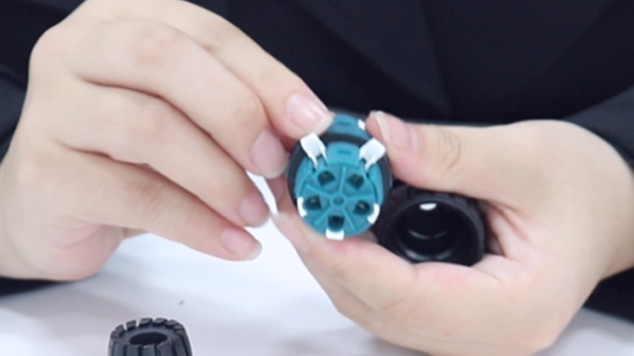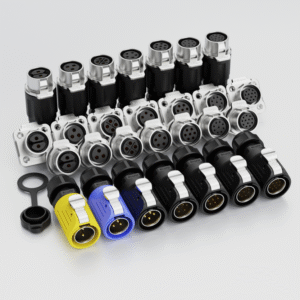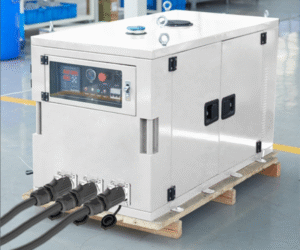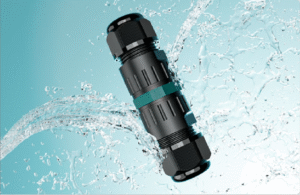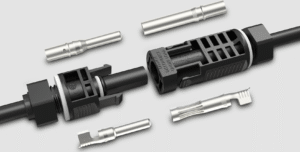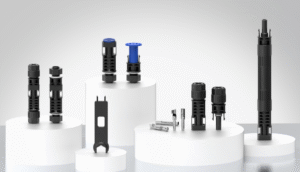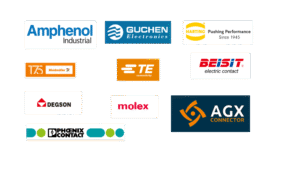Are your electrical connections failing because of water damage? Choosing the right waterproof connector can be the difference between a reliable system and costly failures. This comprehensive guide will walk you through everything you need to know about selecting, purchasing, and using waterproof connectors effectively.
What Makes a Connector “Waterproof”?
Waterproof connectors are specialized electrical connection devices designed with sealing materials like rubber gaskets and O-rings housed in durable casings to prevent water, dust, and other contaminants from reaching the electrical contacts inside. Their protection level is defined by their IP (Ingress Protection) rating, which indicates their resistance to both solid particles and liquids.
The IP rating consists of two numbers:
-
The first number (6 in IP67/IP68) indicates complete protection against dust
-
The second number (7, 8, or 9K) indicates the level of water protection:
-
IP67: Protected against temporary immersion (up to 1m for 30 minutes)
-
IP68: Protected against continuous immersion (beyond 1m)
-
IP69K: Protected against high-pressure, high-temperature jet sprays
-
For most outdoor applications, IP68-rated connectors provide excellent protection, while specialized industrial settings might require IP69K for wash-down environments.
Key Applications for Waterproof Connectors
Waterproof connectors are essential in numerous industries and applications:
-
Automotive: Headlights, taillights, engine wiring, sensors
-
Outdoor Lighting: Garden, street, and architectural lighting
-
Marine: Boats, underwater equipment, docks
-
Industrial: Machinery in harsh environments, factory automation
-
Agriculture: Irrigation systems, monitoring equipment
-
Renewable Energy: Solar installations, wind turbines
-
Security Systems: Outdoor cameras, access controls
Knowing your specific application is the first step to selecting the right connector type.
Types of Waterproof Connectors
Understanding the different connector types helps you choose the right solution for your project:
Circular Connectors
These round connectors are the most common type for industrial and marine applications due to their robust design and excellent sealing capabilities. They come in various sizes and pin configurations.
Rectangular Connectors
Preferred for compact applications like outdoor lighting, these connectors offer space efficiency while maintaining waterproof integrity.
Panel-Mount Connectors
Designed to be installed onto surfaces, these provide a fixed waterproof connection point for equipment housings and control panels.
Inline Connectors
Used to join two cables together, these are common in outdoor installations and temporary setups where cables need to be extended.
Materials Matter: Understanding Connector Construction
The durability of a waterproof connector largely depends on its construction materials:
-
PA66 (Nylon 6/6): Strong, heat-resistant, and durable
-
PA6 (Nylon 6): Flexible, ideal for tools and moving parts
-
PC (Polycarbonate): High impact resistance for rugged environments
-
PP (Polypropylene): Chemical-resistant for industrial settings
-
PBT (Polybutylene Terephthalate): High strength and heat resistance for electrical components
For harsh environments with exposure to chemicals, UV radiation, or extreme temperatures, material selection becomes crucial to connector longevity.
Electrical Specifications and Ratings
Waterproof connectors come with various electrical capacities:
-
Small connectors: Typically rated for up to 5A and 250V
-
Large industrial connectors: Can handle up to 50A and 600V
Always select a connector rated for your specific electrical requirements with an appropriate safety margin.
Installation Best Practices
Proper installation is critical for maintaining the waterproof seal:
-
Follow manufacturer guidelines precisely
-
Ensure cables are properly stripped and terminated
-
Apply the correct torque when tightening connections
-
Use the recommended tools for assembly
-
Verify the seal is properly seated before final assembly
For complex systems or critical applications, professional installation may be necessary to ensure proper sealing.
Maintenance and Longevity
With proper care, quality waterproof connectors can last 5-10 years. To maximize lifespan:
-
Regularly inspect seals and gaskets for wear or damage
-
Clean connectors periodically to remove dirt and residue
-
Replace worn components before failure occurs
-
Protect unused connectors with appropriate caps
Customization Options
Many manufacturers offer customization options for specific requirements:
-
Pin Configuration: Adjusted contact numbers and layouts
-
Material Options: Enhanced resistance to temperature or chemicals
-
Colors and Branding: Custom colors and logos for OEMs and brand consistency
Custom solutions typically require longer lead times (4-8 weeks) and may have higher minimum order quantities.
Understanding Pricing Factors
Several factors influence waterproof connector pricing:
-
Material quality: Higher-grade materials like PA66 and PC cost more but offer greater durability
-
IP rating: Higher protection ratings (IP68, IP69K) command premium prices
-
Order volume: Bulk orders typically receive significant discounts
-
Customization: Special features or branded options add to the base cost
When comparing prices, always consider the total cost of ownership, including potential replacement costs for lower-quality options.
Quality Assurance and Certifications
Quality certifications provide assurance of product reliability:
-
CE: European safety compliance
-
RoHS: Restriction of hazardous materials
-
UL: North American safety standards
-
TUV: German quality certification
Most reputable manufacturers offer warranties of 3-5 years against manufacturing defects.
Typical Ordering Process
The standard procurement process for waterproof connectors includes:
-
Determining specifications and quantities
-
Requesting samples or prototypes
-
Placing a production order (typical MOQ: 100-1,000 units)
-
Production and quality testing (4-8 weeks)
-
Shipping and delivery (2-6 weeks, depending on location)
For new applications, always test samples before placing large orders.
Common Problems and Solutions
Sealing Failures
Often caused by improper installation or poor-quality materials. Solution: Ensure proper installation techniques and use high-quality connectors with proven track records.
Material Degradation
UV exposure and harsh chemicals can compromise connector integrity. Solution: Select materials specifically rated for your environmental conditions.
Electrical Failure
Undersized connectors can lead to overheating and failure. Solution: Always select connectors with appropriate electrical ratings with a safety margin.
How to Select the Right Supplier
When choosing a connector supplier, consider:
-
Manufacturing experience: Established manufacturers typically offer better quality control
-
Certification compliance: Ensure all necessary safety and quality certifications
-
Customization capabilities: Ability to accommodate special requirements
-
Sample availability: Willingness to provide test samples
-
Technical support: Access to engineering expertise for application questions
Decision Checklist
Before making your final decision, verify:
-
[ ] The IP rating matches your environmental requirements
-
[ ] The connector materials are appropriate for your application
-
[ ] Electrical ratings exceed your system requirements
-
[ ] The connector type and style fit your installation needs
-
[ ] The supplier offers necessary certifications and warranties
-
[ ] Lead times align with your project schedule
-
[ ] Sample testing has validated performance in your application
Final Recommendations
For beginners entering the world of waterproof connectors, we recommend:
-
Start with clearly defining your application environment
-
Request samples from multiple suppliers for comparison
-
Test thoroughly in conditions that simulate your actual use case
-
Consider long-term maintenance requirements in your selection
-
Work with suppliers who offer technical support and application guidance
By following this guide, you’ll be well-equipped to make informed decisions about waterproof connectors for your project, ensuring reliable performance even in challenging environments.
FAQs About Waterproof Connectors
How long do waterproof connectors typically last?
With proper installation and maintenance, quality waterproof connectors can last 5-10 years in standard outdoor applications. Harsh environments may reduce this lifespan.
Can I install waterproof connectors myself?
Simple connectors with plug-and-play designs can be installed by individuals with basic electrical knowledge. Complex systems may require professional installation to ensure proper sealing.
What’s the difference between waterproof and water-resistant?
Waterproof connectors (typically IP67/IP68/IP69K) provide complete protection against water ingress during specified immersion or pressure conditions. Water-resistant connectors (typically IP54-IP66) only protect against splashes, rain, or water jets but cannot withstand immersion.
Are all IP68 connectors the same?
No. While all IP68 connectors are rated for continuous immersion, the specific depth and duration can vary between manufacturers. Always check the detailed specifications.
Can waterproof connectors be reused?
Most quality waterproof connectors can be disconnected and reconnected multiple times, but the sealing components may degrade over time and with repeated use. Inspect seals before reuse.
Do I need special tools to install waterproof connectors?
Some connectors require specific crimping tools or torque wrenches for proper installation. Check manufacturer specifications for required tools.
By understanding the fundamentals of waterproof connectors covered in this guide, you’ll be able to select the right product for your application, ensure proper installation, and maintain reliable electrical connections even in challenging environmental conditions.
Have questions about specific waterproof connector applications? Leave them in the comments below!


